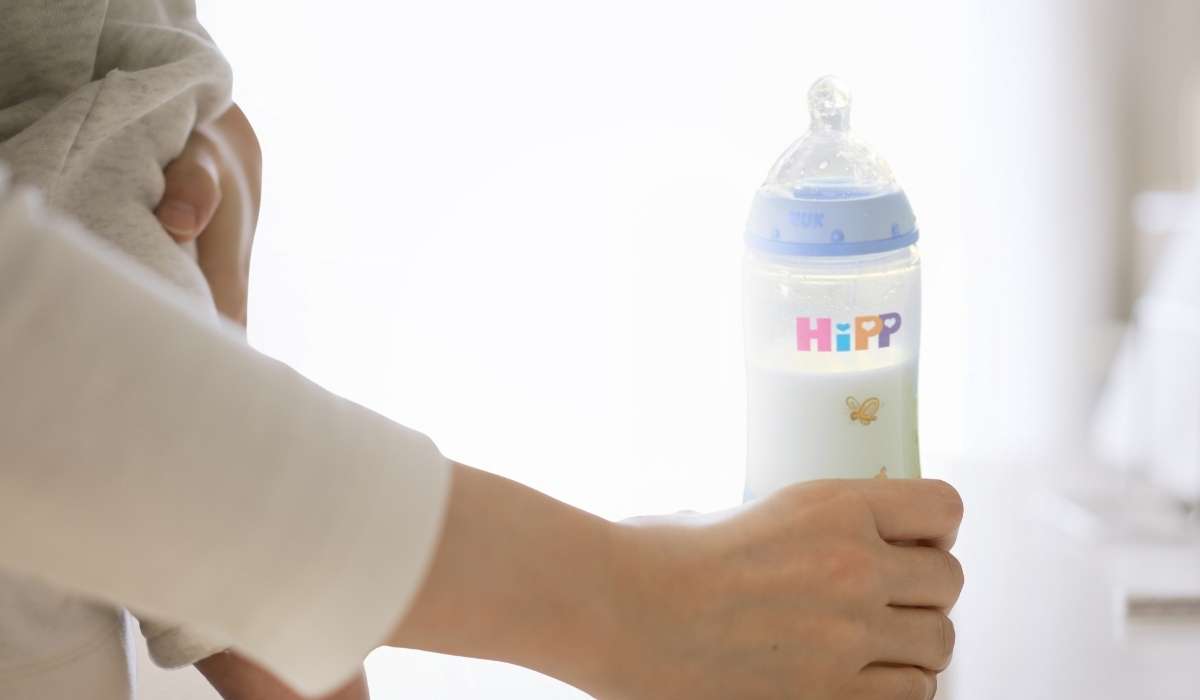Under special circumstances, high-calorie baby formula can be a lifeline, especially for babies who require extra care to thrive. It packs in essential nutrients and a little extra to help your baby get their needed nutritional boost, which could be important if your little one is a preemie or underweight.
In today's guide, we'll unravel what a high-calorie baby formula is, when it's needed, and how to choose the right one. This article will help you understand the crucial role high-calorie infant formula plays for certain babies, plus how to navigate choosing one, so let's dive right in!
Defining What High-Calorie Baby Formula Is
High-calorie baby formula is a type of special formula made specifically for babies that medically require a higher calorie intake. In the medical world, high-calorie formulas are also called high-energy infant formulas, or HEIF for short.
So, what makes high-calorie baby formula so special? It packs in more calories per ounce compared to regular infant formula. To achieve a higher caloric value, formula brands typically turn to additional energy-packed ingredients such as medium-chain triglycerides, proteins, polyose, and oils.
This is done to accommodate babies who have increased energy requirements. Your little one may need extra calories if they were born prematurely or aren't gaining enough weight for their age.
With that said, only a medical professional can determine if you should add high-calorie formula to your child's diet (after a thorough medical evaluation). You should never give your baby high-calorie milk or formula unless your doctor recommends it.
Discover more on this topic: Calories in Formula Matter, Here's Why
High-Calorie Formula vs Regular Infant Formula
HEIF has a higher calorie and nutrient content per ounce compared to normal formula. To help illustrate the difference, the energy content of HEIF can be anywhere from 10 to 50% higher than the regular formula (per ounce).
While your baby is on high-calorie milk, doctors will monitor your baby's health and growth every step of the way to ensure the high-calorie infant formula is doing its job and that your baby is hitting their growth milestones!
Let's take a closer look at the specific nutritional differences between regular and high-energy formulas next!
Nutritional Composition of High-Calorie Infant Formula
A standard formula for full-term babies typically contains about 66-68 calories per 100 ml. The concentration of protein is around 1.4-1.7 g per 100 ml. While regular baby formula is designed to mimic the composition of breast milk, it's not enough for formula-fed premature babies.
Preterm Formula
In the case of formula-fed premature babies, most preemies need to be fed with a special preterm formula. This type contains around 80 calories per 100 ml. It's also enriched with protein (about 2-2.4 g per 100 ml).
Preterm formula also contains more minerals, vitamins, and other micronutrients that are meant to support your premature baby's health.
This formula type is typically used for the nutrition of preterm babies before hospital discharge and generally is not recommended for post-discharge feeding.
Premature Follow-Up Formula
In some cases, a pediatrician may recommend a post-discharge formula (also known as the premature follow-up formula) instead of a regular formula. Post-discharge formula typically packs about 72-74 calories per 100 ml, and the protein content is around 1.8-1.9 mg.
This formula type is also enriched with vitamins, minerals, and other nutrients required for a premature baby's healthy growth.
Examples of Medical Necessity for High-Calorie Formula for Babies
While regular formulas contain enough nutrients and calories for healthy infant development, they might not be enough in certain special cases.
This includes premature infants, babies with a low birth rate, infants experiencing failure to thrive (FTT), and those who happen to have particular illnesses. We will explore these examples now:
1) Premature Infants
Premature babies typically have limited stores of essential nutrients and need more calories to achieve healthy growth. This is especially important for preemies with low birth weight or extremely low birth weight.
High-calorie formulas play the role of the concentrated energy source in this case. Normally, preterm hypercaloric formulas are available in variations of 22, and 24 calories per ounce.
Formula with 24 calories per ounce is typically reserved for infants with a very low birth weight who are not breastfed and need formula after discharge from the hospital.
2) Failure to Thrive
Failure to thrive (FTT), also known as weight faltering, is a lack of adequate weight gain in infants. In other words, this diagnosis means a baby's current weight or weight gain rate is significantly lower than their peers of the same age and gender.
About 5-10% of babies in the US are diagnosed with FTT. It can be caused by inadequate calorie intake and insufficient energy absorption, among other reasons.
Given that several factors might cause FTT, it is crucial to get a medical evaluation if your baby isn't gaining weight properly for their age.
3) Low Birth Weight
Babies are classified as having low birth weight (LBW) if born weighing less than 5.8 pounds (2500 g). In many cases, they are preemies that have had less time in the womb to grow and gain sufficient weight. However, it's also possible for full-term infants to have low birth weight.
The treatment for LBW must be determined by a medical professional. They will consider the baby's health, medical history, and tolerance of medications. In most cases, infants with LBW require care in the neonatal intensive care unit and special nourishment.
Hypercaloric premature formulas are not intended for feeding LBW infants after they reach a certain weight (between 5.5 and 8 pounds, depending on the formula), which must be determined by a pediatrician.
4) Illness
Babies with certain health issues often face feeding difficulties or the inability to tolerate sufficient formula or breast milk volumes to achieve adequate growth.
In this case, a formula with an enhanced caloric concentration may help as babies can consume less formula while getting the required amount of nutrients to boost their growth and development.
Types of High-Calorie Baby Formulas
Once you get the green light from your baby's doctor, you can proceed with choosing a type of formula that would work best for you and your little one. Here are a few different options available on the market:
Powder Formula
Powder formula is relatively affordable compared to other formulas and widely available, making it a popular choice. However, it can be a bit messy to prepare as the formula powder has to be mixed with safe water according to the indicated ratios.
Concentrated Liquid Formula
Concentrated liquid formula offers increased convenience as it tends to be less messy and time-consuming when compared with powder formula. That being said, this formula type is a bit pricier.
Ready-to-Feed Formula
Ready-to-feed formula takes no time to prepare, as all you have to do is open the bottle. It's an ideal solution if you're busy or on the go. It's also an excellent way to make those stressful nighttime feedings a bit easier.
With that said ready-to-feed formulas can be quite expensive. They aren't the best solution for the environment either, as you will go through many plastic bottles when buying ready-to-feed milk.
What is High-Calorie Breast Milk, and How Can You Prepare It?
If you decide to breastfeed, it is also possible to make your breast milk more suitable for a baby that requires additional calories. However, increasing the caloric value of breast milk must be done under the guidance of a qualified healthcare professional.
Let's explore a few methods for creating high-calorie breast milk:
1) Human Milk Fortifiers
A breast milk fortifier is a nutritional supplement (powder) that you can add to pumped breast milk. It contains extra calories, protein, and essential vitamins, which can help your baby gain weight.
Milk fortifiers also work to promote growth and bone development during the first few weeks of life.
High-calorie breast milk is typically used in neonatal care, especially for babies with growth problems as well as preemies.
2) Changing the Nursing Mother's Diet
If your baby's doctor suggests this, you can adjust your diet to increase the calories in your breast milk. It is typically recommended for mothers to consume more healthy fats from protein sources such as avocados, nuts, seeds, olive oil, salmon, eggs, etc.
One other benefit of this method is that increasing your protein intake may signal your body may start producing more breast milk, which can be the perfect solution when dealing with a low breast milk supply that might be affecting your baby's weight gain.
Taking iron supplements may also help increase milk production. That being said, you should add supplements to your diet only after talking to a medical professional as it can have implications for your baby's diet as well.
3) Adding Formula to Breast Milk
Another way to make regular breast milk more nutrient-dense for your baby is by adding infant formula to it. All you have to do is add some formula powder to pumped breast milk and mix them well together.
For the breast milk to contain 22 calories per ounce, add 1/2 tsp of regular formula powder to 3 ounces (89 ml) of pumped breast milk.
To make 24-calorie-per-ounce milk, add 1 tsp of formula to 3 ounces (89 ml) of pumped breast milk. Make sure to stir well to avoid clumps of powder. It will be easier for your baby to take this milk in if it has a smooth texture.
Keep in mind that you don't need to use a special premature formula when making high-calorie breast milk for a premature baby; regular formula works fine.
You may be interested in our article: Can You Breastfeed and Use Formula? Combination Feeding 101
Choosing the Right High-Calorie Formula for Your Baby
You will need a prescription from your baby's doctor for a high-calorie formula suited for your baby and their specific needs. Make sure to follow the doctor's recommendations and never increase your child's caloric intake without talking to a pediatrician first.
A pediatrician can also help you navigate among the options on the market and choose a formula that best suits your little one.
It's also important to be aware that currently, in the United States, there are lawsuits for certain premature formula manufacturers due to concerns over an increased risk of necrotizing enterocolitis (NEC) - a serious gastrointestinal condition - in premature babies. It's worth raising this concern with your pediatrician.
Monitoring Feeding and Weight Gain in Premature and Underweight Babies
When making high-calorie formula a part of your baby's diet, make sure you run this through your baby's doctor and stick to proper feeding techniques.
Normally, formula-fed newborns consume about 8-12 feedings within 24 hours. However, it is important to work closely with your baby's doctor to establish a feeding schedule that will ensure your little one gets enough calories and nutrients throughout the day.
A medical professional should help you determine how much milk/formula your little one should consume daily based on their overall health and specific needs.
In babies weighing less than 2.2 pounds (1 kg) at birth, it's typically advised to start nutritional feeds at 15-20 ml/kg per day. As for babies weighing more than 2.2 pounds (1 kg) at birth, it's often advised to start nutritional feeds at 30 ml/kg daily.
Your baby's doctor will check their weight, height, and head circumference regularly to catch any potential deviations from expected growth curves. This will help assess the effectiveness of the chosen formula. Monitoring your baby's progress will also help you and your baby's medical team adjust their diet if needed.
The desired weight gain would depend on your baby's size and gestational age. It might be as little as 5 grams or 0.17 ounces a day for a tiny baby at 24 weeks, or as much as 20 to 30 grams (about 2/3 to 1 ounce) a day for a larger baby at 33 or more weeks.
The expected weight gain would also depend on your baby's overall health. General guidelines suggest that your baby should gain about a quarter of an ounce (7 grams) each day for every pound (1/2 kilogram) they weigh.
FAQs About High-Calorie Formula for Infants
Making high-calorie formula a part of your baby's diet often comes with many questions compared to feeding regular breast milk or regular formula.
Here are some common questions that parents have about high-calorie milk and answers that will hopefully provide you with further clarity on the subject.
Which Baby Formula is High in Calories?
Any formula that contains at least 22-24 calories per fluid ounce is considered high-calorie milk. Some brands may even offer 27 calories per ounce.
Keep in mind that you can only feed your baby with a high-calorie formula after getting approval from a medical professional; otherwise, breast milk or regular formula works fine for healthy babies.
Which Formula is Best for Baby Weight Gain?
The best formula to help your baby gain weight properly is the one recommended to you by your pediatrician. This is because the formula choice will depend on your child's specific needs, which only a medical professional can assess accurately.
How Do You Increase the Calories in Baby Formula?
Your baby's doctor can offer appropriate and safe methods for preparing formula to ensure that your baby gets the extra calories they may need.
How to Make 22-Calorie Baby Formula?
To make 22-calorie infant formula, mix 2 scoops of premature follow-up formula with 4 ounces (118 ml) of water.
Remember, you should only increase the calories of your baby's formula if your baby's pediatrician has given you the green light. Feeding your baby with high-calorie milk when they don't actually need it can lead to health problems.
Wrapping Up
Typically, regular baby formula contains about 20 calories per ounce. On the flip side, high-calorie milk may contain 22 or 24 calories per ounce and also has a higher protein content compared to regular infant milk.
High-calorie baby formula can be a real lifesaver for some infants with unique nutritional needs as it gives them the extra boost of calories they require. That being said, it's crucial to get medical guidance from a healthcare professional before turning to high-calorie formula.
It's important to remember that breastfeeding is the optimal source of nutrition, and most babies will do just fine with breast milk or conventional formula.
If your baby has a diagnosis that necessitates the use of a high-calorie formula, remember to follow package directions and stay consistent with medical evaluations to monitor your baby's growth.
Breast milk is the best source of nutrition for babies. Before altering your baby's diet or feeding routine, consult your healthcare provider for personalized recommendations. The information in this article is strictly for informational purposes and is not a substitute for medical advice.





